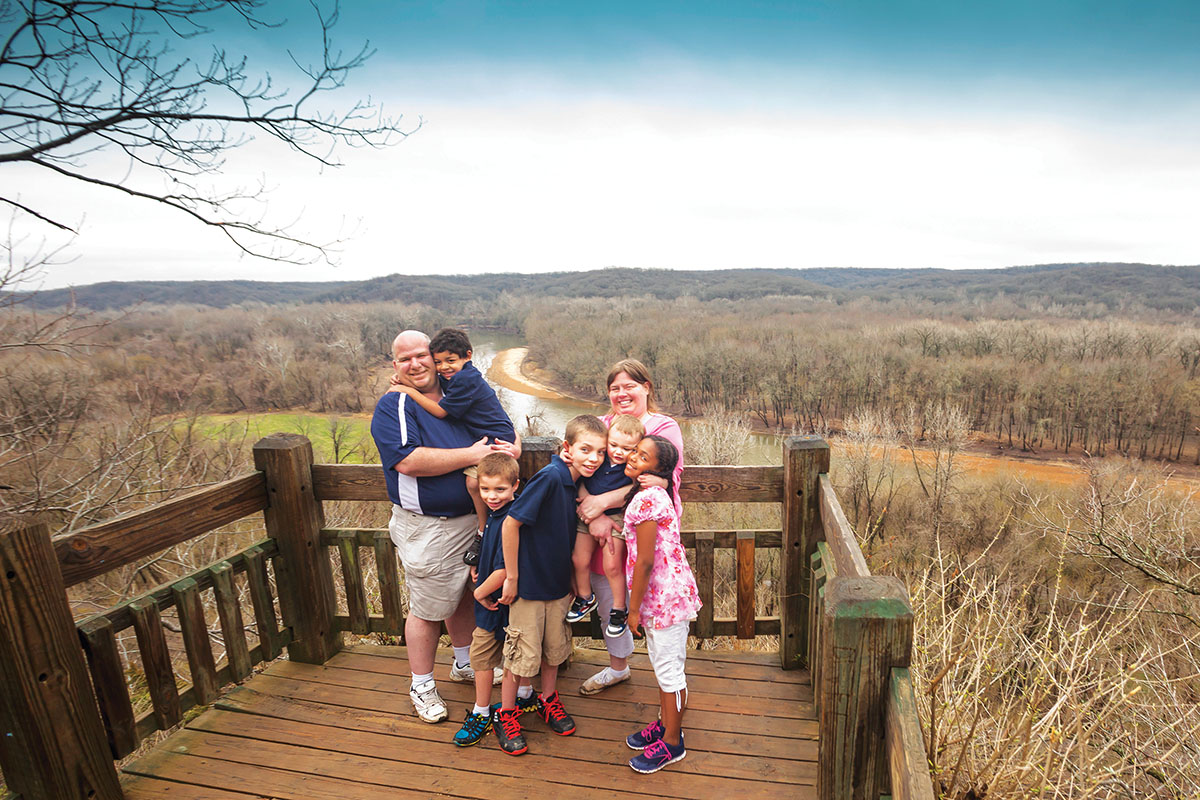Six years ago, Jim and Bobbie Jo Parker, recently licensed foster parents, got the call. Some children had just been rescued from a violent home in northern Missouri. Would the Parkers be willing to take in two?
The Parkers readily agreed — so readily, that the social worker called back a few minutes later.
“What if it’s five children? We don’t want to split them up right now. It would be temporary…” Jim and Bobbie Jo exchanged glances. They already had two foster kids staying with them. Did they really think they could handle seven children, five of whom were terribly abused, all at once?
“Sure, we can take all five,” they agreed.
The children entered the house shyly, their timid steps due as much to bruises as to nervousness. Before that, they’d been at the hospital, because one of them, the oldest girl, had been beaten so badly she could hardly walk.
“I will never forget the looks on their faces,” Bobbie Jo recalls. “They were very scared, very sad, very physically hurt children. We got them to bed, and we promised them over and over again that we would keep them safe.”
The children had survived years of horrible abuse that included beatings, sexual assaults, neglect and verbal abuse, and it had done its damage. Developmentally delayed, distrustful, withdrawn — any one of them alone would have been a challenge to seasoned foster parents.
Greg Echele, chief executive officer of Family Resource Center (FRC) — whose affiliated company, Children’s Permanency Partnership, licensed the Parkers to become foster parents — remembers the case. “Usually, these kids would have been split into five homes or maybe two and two and one, because normally foster parents wouldn’t think they had the ability to take five injured kids at one time,” Echele says. “I’ve never seen that happen in all of my years.”
And Echele has been involved in the prevention of child abuse for decades.
Prior to helping found FRC in the 1970s, Echele was the director of social services at St. Louis Children’s Hospital and was responsible for developing several new programs, including one that would help the hospital better manage cases of suspected child abuse.
“One of our goals with the Brown School is to develop the definitive model for the elimination of chronic child abuse.”
Greg Echele
Simultaneously, at Washington University, Bob Pierce, MSW ’69, PhD ’79, then a professor at the Brown School, wanted to create a stand-alone nonprofit center to serve abused children and abusive adults before kids wound up in the emergency room.
In 1973, Pierce was teaching a course at Brown in child-abuse treatment and prevention, and he and two graduate students discovered that the federal government was looking to develop model programs around the country to do the very thing that Pierce envisioned and Echele was trying to set up at Children’s Hospital.
Though they didn’t know each other, Pierce called Echele, and together, along with two social work graduate students, Phyllis Rozansky, MSW ’74, and Susan Keller, AB ’72, MSW ’73, they wrote the grant proposal for FRC. Pierce, Rozansky and Keller searched the literature for the best evidence-based practices for the center’s potential programs. Echele built up the infrastructure, securing a partnership with Children’s Hospital to get doctors to oversee potential programs and help the center administratively.
In the end, though, the most long-lasting partnership that emerged was the one between Washington University and FRC, founded in 1974. A few years later, after the federal grant money expired, Children’s Hospital helped the center become fully independent, and Washington University faculty and students have remained a critical part of the center ever since.
“All Brown faculty do community-engaged research,” says Melissa Jonson-Reid, PhD, professor of social work, who works closely with FRC. “There’s an advantage to having agencies that are eager to partner, because this allows the agency and faculty to advance and improve outcomes.”
Nine Brown School faculty members work with the Family Resource Center on program development and evaluation. The center, therefore, gets improved, evidence-based programs, while faculty members conduct research on child welfare and child maltreatment. The partnership also offers social work students practicum opportunities.
FRC’s flagship programs include a therapeutic day-treatment preschool for children between 3 and 5 years of age who have suffered abuse, a family treatment program to help parents break the cycle of abuse, and a foster-care program for children who can’t stay safely with their families. PathBuilders, another key program, addresses both the psychological and the social/environmental contributors to child abuse. Dealing with root causes, such as unemployment, increases the likelihood for successful outcomes. These FRC programs and others are rigorously reviewed and grounded in evidence-based practices.
“One of our goals with the Brown School is to develop the definitive model for the elimination of chronic child abuse,” said Echele in a 2007 issue of the Brown School’s magazine, Social Impact. “We want to examine each program for its evidence base, document the evidence if it doesn’t exist currently or find new interventions that are rooted in evidence.”
A few years ago, J. Curtis McMillen, PhD, then a professor at the Brown School, reviewed more than 100 evidence-based practices with the family treatment department at FRC. Of the evidence studied, the staff implemented seven new programs including trauma-focused cognitive behavioral therapy, motivational interviewing and parent-child interaction therapy (PCIT), which teaches parents how to help a child with social and behavioral problems increase pro-social behavior and decrease negative behavior. More recently, a Brown School doctoral candidate, Paul Lanier, PhD ’13, studied PCIT program participants and showed that parents who completed PCIT had statistically significant improvements in mental health and reduced parenting stress.
Brett Drake, PhD, professor of social work and Lanier’s graduate adviser, says the partnership offers a critical link between theory and practice.
Jonson-Reid, who is also director of the Center for Violence and Injury Prevention, concurs. “However, it isn’t just a passive partnership on one side,” she says. In 2009, when Jonson-Reid was setting up her center, she turned to FRC for advice.
A shared desire to help abused children and their families brought a professor, two students and Echele together 40 years ago. “And that theme has run through the Family Resource Center all these years,” Echele says.
The strength of FRC helped the Parkers. The parents received extensive foster-care training, and the children each had an individualized treatment program. And with FRC’s help, the Parkers adopted four of their new charges (the fifth child moved to live with her biological father).
Echele remembers when the adoption was being finalized; the Parkers asked the kids if they wanted to choose a new name to signal their new beginning. The second-youngest of the siblings, who was only 3 at the time, enthusiastically replied, “Spiderman!”
The Parkers weren’t sure what to say, but one of his cousins asked, “Do you know what Spiderman’s real name is?” The boy shook his head no.
“Peter Parker,” the cousin replied.
Echele says that such endings make the work gratifying. “After all of the misery these kids go through, we get to be the people who break the cycle of violence and really allow them to have a better life than they would otherwise,” Echele says.

